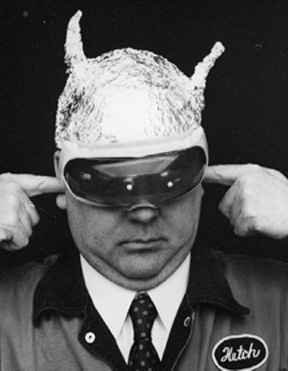First came the Baltimore judge who married a man, accused of domestic abuse, to the man's victim. Now comes a Trinity County (California) judge rebuked by the State of California Commission on Judicial Performance for allowing a man to wear a tin-foil hat during court proceedings, according to an April 13 dispatch from the San Francisco Daily Journal.
(The story was sent to us by the same Los Angeles lawyer who alerted us to the case of the Baltimore judge. It is reassuring to know that some lawyers are spending time doing what lawyers should be spending time doing: scouring the press for examples of courtroom monkeyshines the existence of which suggest to the layperson that the legal system is rife with human fallibility, a cheering thought for humanists but a no doubt terrifying one for, say, those on trial for murder.)
The 2000 U.S. Census reported that Trinity County, in northwestern California, had a population of 13,022. There are no doubt more folks there today, but they are spread out over two million acres. The area has no incorporated cities, but does have charmingly-named towns such as Hayfork, Lewiston, and Weaverville (below).
May we assume, then, that in such an area everyone pretty much knows everyone else, and that a small-town sense of humor - in-jokes, comfortable hokiness, a genial disdain for tendentiousness - pertains?
We can infer as much from the Daily Journal piece, which reports that Trinity County Superior Court Judge Anthony C. Edwards, who is one of but two judges in the heavily wooded area (see?), not only knew the man who wore the tinfoil hat, but knew that the man had joked months earlier about wearing such headgear to avoid jury duty.
This proved to be simply too much for the Commission, which in its April 12 report wrote that "it reflects a lack of decorum for Judge Edwards to have allowed the potential juror, who he knew was joking, to leave the tinfoil hat on his head during court proceedings."
Judge Edwards does seem to show what, in some eyes, could be seen as an alarming laxness regarding his office. In other eyes, however, it could be seen as an admirable informality, the hallmark of small-town life.
On one occasion, having recused himself from presiding over the case of a woman named Corrie Floris, who was accused of stabbing her boyfriend (they party hard in Trinity County), Edwards nonetheless presided over her arraignment, after which gathering he hugged her in full view of the courtroom.
Edwards and his wife, Cynthia, a lawyer, were friends with Ms. Floris; in court, Cynthia Edwards "stood up" for the woman and advised the judge - her husband - to appoint a public defender.
 On other occasions, according to the Commission report, the judge dismissed cases without legal authority, showed bias, and one time sauntered into court two hours late after taking court staff for a ride in his airplane and out to lunch.
On other occasions, according to the Commission report, the judge dismissed cases without legal authority, showed bias, and one time sauntered into court two hours late after taking court staff for a ride in his airplane and out to lunch.This last seems entirely excusable and understandable. Is there really anything so important on the Trinity County legal docket that it should interrupt a pleasant repast and a refreshing airplane ride?
Edwards' attorney, Joseph P. McMonigle, told the Daily Journal that Judge Edwards "respectively disagrees" with the Commission's report. Actually, it is unclear whether or not Mr. McMonigle said this. The correct phrase is "respectfully disagrees." Either Mr. McMonigle misspoke, or Daily Journal reporter Amy Yarbrough mis-heard him, or Ms. Yarbrough heard him correctly and mis-typed his words. Alas, we shall never know.
It is plain, however, that Ms. Yarbrough wrote a surrealistic and incomprehensible lede: "Wearing a tinfoil hat may not get you kicked off a jury in Trinity County, but it will get you a rebuke from the Commission on Judicial Performance - if you're the judge who allowed it." For this, Ms. Yarbrough should be sentenced to thirty days of hard labor - say, parsing the "writings" of Sarah Palin, whose relationship with the English language is as informal as is Judge Edwards' with those who appear in his courtroom.





No comments:
Post a Comment